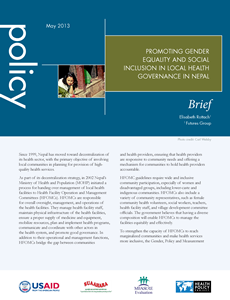The Health Policy Project ended in 2016. Work continued under Health Policy Plus (HP+) until 2022.
PUBLICATION
Author(s): Elisabeth Rottach
Primary Language: English
Date: 5/31/2013
Abstract:
The Nepalese government has prioritized mainstreaming gender equality and social inclusion in the country’s health policies and programs in order to improve the quality of equal access to health services for all. In support of this goal, management of local health facilities was handed over to Health Facility Operation and Management Committees (HFOMCs) to increase the involvement of local communities in planning for the provision of high-quality health services. HFOMCs work to bridge the gap between communities and health providers and their guidelines require wide and inclusive community participation, especially of women and other disadvantaged groups. To strengthen the committees’ capacity to make health services more inclusive, the Gender Policy and Measurement Program (GPM), an activity of the Health Policy Project (HPP) and MEASURE Evaluation, has partnered with the Suaahara Project to design, implement, and evaluate a scalable intervention to overcome barriers to HFOMC participation for women and other disadvantaged groups. This intervention will ultimately strive to improve family planning and neonatal health outcomes among marginalized groups.
Brief Equity Family Planning/Reproductive Health (FP/RH) Gender Governance, Stewardship & Accountability (GS&A) Maternal Health Policy AME Region


